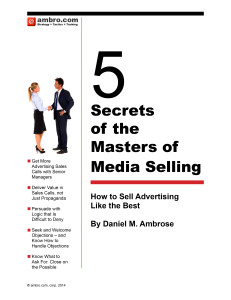Ad-sales people generally don’t like to be told how to do their job. One reason they are in sales is they like the independence that comes with success. And no one, neither sales nor management, likes to admit there has been money left on the table, un-made sales that were attainable.
But experienced management knows that the world is changing, that clients’ needs are changing, and that competition is changing. And all sales people and management wants to gain sales and market share. Winning more sales and more often has a very high ROI. Even a small percentage effectiveness lift will have a very high conversion to profits.
 When management does decide to invest in sales training, it is important to think carefully about the team’s needs and objectives. What are the sales-missed symptoms? Do sales people primarily need to get in the room with more prospects? Or are they making a lot of sales calls with a low-closing ratio? Do they need cold-calling reinforcement to get more appointments or objection-handling training?
When management does decide to invest in sales training, it is important to think carefully about the team’s needs and objectives. What are the sales-missed symptoms? Do sales people primarily need to get in the room with more prospects? Or are they making a lot of sales calls with a low-closing ratio? Do they need cold-calling reinforcement to get more appointments or objection-handling training?
In the world of advertising sales there is an epidemic of “good calls” that go nowhere. The sales person comes back and reports the meeting “went well,” then the prospect never answers any of the follow-up. This can be a signal that the sales people aren’t uncovering the objections so that they can be answered. Often ad-sales people forecast business based on one very friendly sales call, but they never pressed to find out all the hurdles they needed to clear to win business. Media buyers are notoriously “nice,” but they are often hiding their objections, because they just want to make their own decisions with their colleagues and not air all their thinking. It’s quite a challenge to really get media decision-makers to say “this is nice, but it will never happen because blah-blah-blah.” That is actually what is too often going on in their heads.
Management may wish to diagnose the issues to be addressed, or engage their sales trainer in the information gathering that will help direct the sales training effort to the issues that do the most good.
In the world of ad-sales, there are generally three buckets of skills. A complete training course will address each in detail. But often management will agree that it’s one particular issue that needs attention. Here are the three ‘buckets:”
- Time & Territory Management and Prospecting: How to get to the right place, at the right time, with the right information to make sales. None of the other skills or tactics work if they aren’t applied to qualified prospects at the opportune time.
- Powerful Persuasion: How to organize, assemble, and deliver a powerfully persuasive pitch. Whether verbally over the phone, or in- person to a large meeting, all persuasion must deliver on the structure that persuades; starting from assumptions the prospects easily agrees with to the logical conclusion of an order. Too many sales people don’t get the agreement to assumptions, then are surprised their very nice contact doesn’t agree with their conclusion.
- Successful Interactions: Probing for opportunity and for objections. Objection handling, negotiating and closing are the back-and-forth sales skills that need to work to win the most business. Fear of objections often leads to little probing. And fear of asking “stupid” questions prevents sales people from finding the big opportunities.
Advertising sales really is different than selling other big-ticket business-to-business services. Be sure you know what you need before you contact sales trainers, or simply let them help you determine where the emphasis should lie. Ambro.com will often conduct a survey of your sales team to help guide the training focus effort. This has the added value of involving the sales team leading to greater engagement in the training process.
https://www.sellingpower.com/2019/01/08/15252/quick-guide-to-selecting-a-sales-training-provider

